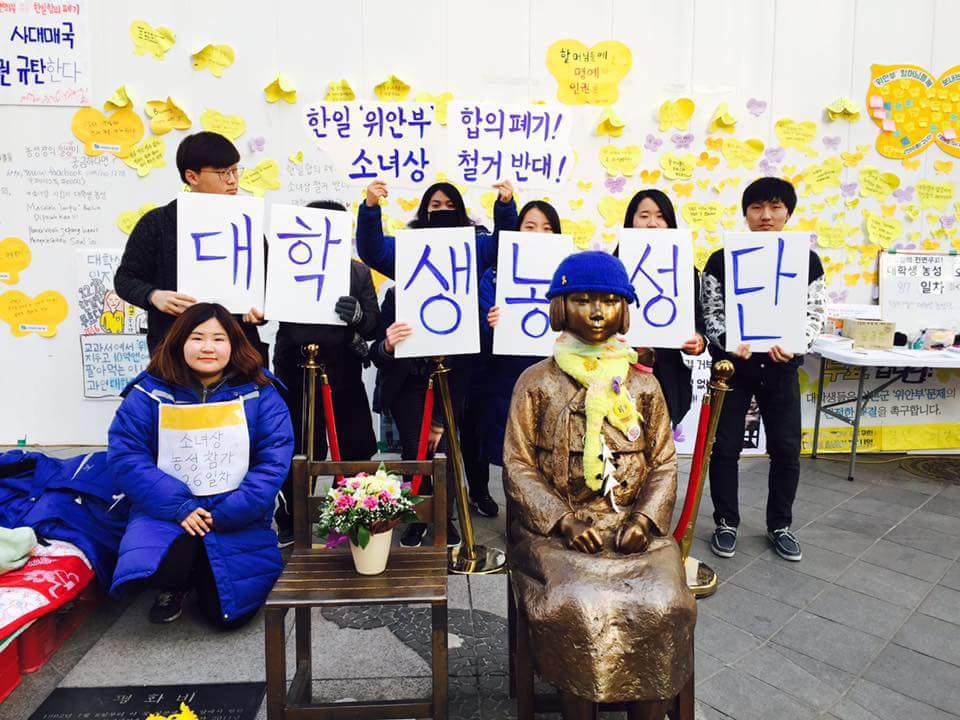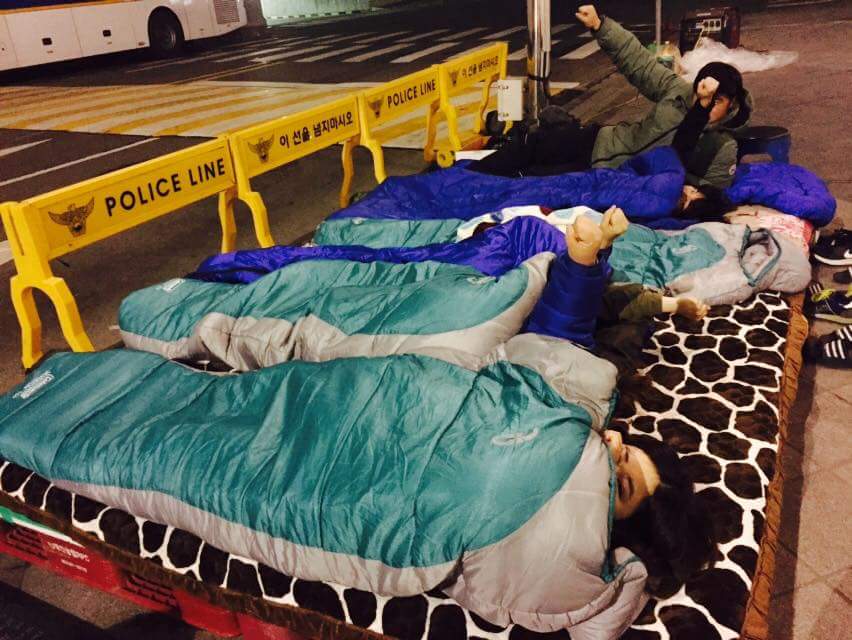“Some Europeans showed interest and would say, ‘Oh, I’ve heard of Comfort Women’.” We are thankful, of course, for their empathy, but we also correct the term usage. They are ‘sex slaves of Japanese military’, not Comfort Women.”
Violence against women during times of war and conflict is not unheard of. One only has to look at the crisis in Syria, where women are said to be committing suicide to avoid being sexually assaulted. In 2015, media reports suggested that women were being raped and tortured by troops loyal to the Syrian regime.
Such reports are often dismissed as lone cases amid chaos. But could one imagine a government systematically operates sex brothels for their military men during a war? We don’t have to imagine – because that’s exactly what happened during World War II.
During the war, much of Korea was controlled by Japan and pro-Japanese forces. “Comfort Women” were those who had been forced into “sexual slavery” by Japan’s Imperial Army.
Survivors have since revealed that young women were abducted from their homes in the occupied parts of Korea or tricked to leave their homes on the false promise of being offered work. The “Comfort Women”, which translates to a euphemism for “prostitute” in Japanese, were then raped and killed.
Today, members of Hope Butterfly are fighting hard to gain justice for these women. The IPF spoke to two young members of Hope Butterfly in South Korea, Yoo Hyo-jeong and Kim Myung-hyun, about their fight for justice.

During the demonstrations, the women stand by the Statue of Peace, which sits in honour of WWII’s Comfort Women. [Image credit: Hope Butterfly]
The Statue of Peace
“The name ‘Hope Butterfly’ was chosen to symbolise our efforts to resolve the Comfort Women issue,” explained 21-year-old Myung-hyun.
Her and her fellow team members have participated in a number of demonstrations, which sees them convene outside Japan’s Embassy in Seoul on Wednesdays and demand the Japanese government to address the issue. For Hyo-jeong, 21, it’s hard to even imagine being in the shoes of the Comfort Women.
“If I were dragged to the brothel by Japanese soldiers, only to be raped dozens of times on a daily basis and have my body stabbed, burned and thrown out like some carcass, I would have ended up killing myself. Even if I survived, I wouldn’t have had the courage to speak out about all the horrible things done to me.”
During the demonstrations, the women stand by the Statue of Peace, which portrays a petite teenage girl dressed in the traditional Korean Hanbok attire. The girl has short hair and her small hands are bound in tight fists as she sits on a chair and stares at the Japanese Embassy. A chair next to her lies empty. The empty chair rests in honour of the Comfort Women, whose names have been forgotten, as well as for present and future generations who fight for hope together.
A shadow on the ground represents the long years of horror the survivors were subject to, having grown into adulthood haunted by their trauma.

[Image credit: Hope Butterfly]
The Comfort Women Agreement
A large portion of Hope Butterfly’s work focuses on abolishing the Korea-Japan Comfort Women Agreement, which was decided in December 2015. The agreement states that South Korea will officially establish the Foundation for Reconciliation and Healing to assist surviving Comfort Women and relatives of deceased Comfort Women, while Japan will provide 1 billion yen ($9 million) to the Foundation. South Korea will also provide 20 million won ($18,000) to families of deceased Comfort Women and 100 million won ($90,000) to surviving Comfort Women.
However, many believe that the Agreement lets Japan off the hook too easily. Members of Hope Butterly and university students associated with the movement have hosted a number of protests against the Agreement on campuses across the country, blaming the Park Geun-hye government for it.
Myung-hyun explained:
“Everything we have worked hard for has gone down the drain because of Park Geun-hye administration. It’s outrageous how they have mistreated us when the least they could do is help us. I feel so ashamed of this administration.”
Hope Butterfly pointed out that despite the Agreement including a verbal recognition by Japan of the involvement of Japanese military, the Deputy Foreign Minister, Shinsuke Sugiyama, told a United Nations panel that there was no evidence of Japanese military or government involvement in “procuring the women”.

Despite the passing of the Agreement, young Koreans are determined to continue fighting for justice – no matter what it takes. [Image credit: Comfort Women]
Young Koreans’ dedication to the cause
In protest against the Agreement, university students have sat by the Peace Statue for more than 300 days to ensure the statue remains where it is. While numbers were high during the early days of the protest, Hope Butterfly said that participation has started to dwindle.
Hyo-jeong explained why this might be the case:
“The Park administration’s failed policies have prolonged stagnation and exacerbated youth unemployment issues that young people can’t afford to make time for what they believe in.”
However, she said that she knew about students who had gone so far as to take the whole semester off just to join the protest. As for herself, she has to drive three hours from where she lives to the Japanese Embassy in Seoul.
“In the summer, the heat and humidity are almost unbearable and on top of that are a lot of mosquitoes,” she said. “In the winter, it’s brutally cold and windy so we drape a thin plastic sheet over a pillar like a tent. But because the wind is so strong, we also bring sandbags to block the sheet from flying away.

Young Koreans camp out by the Peace Statue, with some even taking whole semesters off from university to ensure the statue remains where it is. [Image credit: Hope Butterfly]
“It’s really difficult to get some sleep at night because of all kinds of noises and the lights. After the demonstration, I always end up sleeping throughout the entire day.”
To add onto the difficult conditions, protesters say they have had their sandbags and pillars confiscated by the police with no explanation, as well as received threats to have their sleeping bags taken away as well.
“The police are acting as the government’s underdog by blindly following their orders,” said Hyo-jeong. “The police are supposed to be on the side of the people, yet they are monitoring us.”
Myung-hyun agreed, adding that President Geun-hye was to blame for signing the Comfort Women Agreement in the first place.
“If Park Geun-hye didn’t have a skewed and distorted historical perspective, then all of this would not have happened. People with authority have such wrong values, police are ordered to monitor us and have brought four massive police buses to disturb our demonstration. The smoke and the ignition noise coming from the buses are unbelievable. They are treating us like criminals.”
Lessons from Europe
Myung-hyun and Hyo-jeong have travelled beyond South Korea to get their message out into the world. So far, they have been to Germany, France, Switzerland, Czech Republic, Japan and the United Kingdom.
Despite their travels leaving them broke, Hyo-jeong said that she was glad they went because they were able to raise awareness about the Korean women who were kept as sex slaves – as well as find ways to solve the problem.

During their tour through Europe, young women campaigning for justice for ‘Comfort Women’ say they learned a lot about how to carry their cause forward. [Image credit: Hope Butterfly]
“There are only a handful of museums in Korea dedicated to the sex slaves and none in Japan. On the contrary, Holocaust Memorial museums, parks and monuments can be seen everywhere throughout Germany so as to remind people of what is wrong and to never repeat the past atrocity. Germans have shown true remorse in this way and this is what the Korean people want from Japan.”
She continued: “Some Europeans showed interest and would say, ‘Oh, I’ve heard of Comfort Women’.” We are thankful, of course, for their empathy, but we also correct the term usage. They are ‘sex slaves of Japanese military’, not Comfort Women.
“For true peace, leaders must prioritise human rights and the government of Japan must sincerely apologise and make constant efforts to teach their people of true history.”

